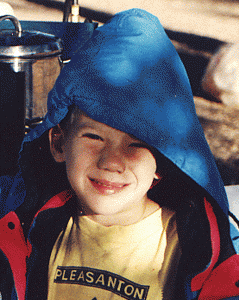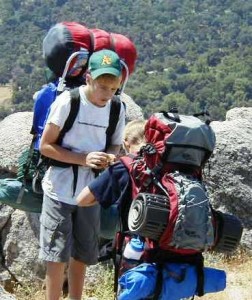 When most of us hear the term tree hugger, we think of an environmentalists. Whether we hear the term as derogative or effective is not the point. The point is that the tree hugger is trying to save the tree.
When most of us hear the term tree hugger, we think of an environmentalists. Whether we hear the term as derogative or effective is not the point. The point is that the tree hugger is trying to save the tree.
There is another tree hugging movement whose objective is not to save the tree, but to save the tree hugger. The focus of this movement is not big huggers, but little huggers, between the age of 7 and 11.
In Feb of 1981, 9 year old Jimmy Beveridge and his two brothers hiked a popular nature trail on Palomar Mountain. Merely a half mile from where their parents were preparing lunch, Jimmy became separated. The brothers, assuming Jimmy was racing them back to camp, quickly returned. Jimmy did not. After 4 days of intensive search and rescue (SAR) efforts, Jimmy’s body was discovered 2 miles from camp. He had died from hypothermia.
Tragedy and grieve are sometimes catalysts for noble plans of action. Ab Taylor, who participated in Jimmy’s search, was determined to do something to prevent similar tragedies. Working with a team, he created the Hug-a-Tree and Survive program targeted at very basic survival skills. In 2005 Ab donated the rights to the program to the National Association for Search and Rescue.
The principle of the program is simple: A lost child who stays put is easier to find than one who keeps moving. Initial searches typically focus where the child was last seen. If the child keeps moving, that information becomes less and less helpful. Once an area is searched, resources focus on other locations. A moving child may enter a previously searched area, making the search and rescue more difficult.
Targeted for young children, the Hug A Tree program is designed to be delivered in about 30 minutes. It typically covers these main points:
- Hug A Tree: When you are lost stay put. Find a tree and hang on to it. Since the tree won’t move, neither will you. A tree is alive, just like your pet. You can name your tree and talk to it. It will help protect you.
- Always Carry a trash bag and whistle: A trash bag is easy to carry in your pocket and easy to make into a jacket. It will provide you protection from water and cold. A whistle is easy to carry and can be heard from a longer distance than yelling.
- Your family will not be angry with you: Anyone can get lost. Do not feel embarrassed or ashamed. Do not hide from your rescuers. Get comfortable and remain calm, knowing help is on the way. Your family loves you and will be very happy to see you.
- Make yourself big: Make it easier for others to find you. Wear bright colors. Blow your whistle. Make a big X in the ground with sticks or rocks.
- Animals are afraid of humans: If you hear a noise blow your whistle or yell. If it is an animal, it will run away. If it is a rescuer, you will be found.
- You have hundreds of friends looking for you: If you hear people yelling your name they are not angry. They are trying to find you. Yell back, or blow your whistle.
Parents also play a key role. The messages for parents include:
- Prevention is key. Make sure your child understands the main points of the program. Help arrange a presentation at your school, church, or youth organization.
 Footprint your child. A small piece of aluminum foil can be used to create a imprint of your child’s shoe. Place the foil on a towel and have your child step on it. It can be an extremely valuable tool for searchers.
Footprint your child. A small piece of aluminum foil can be used to create a imprint of your child’s shoe. Place the foil on a towel and have your child step on it. It can be an extremely valuable tool for searchers.- Call for help right away. If the child is moving, the search area will be expanding exponentially. The sooner the search starts, the more quickly the child will be found.
- Be available for interviewing. Searchers rely on clues to find lost children. You are the best source for clues. Be available to provide them.
There is nothing scarier to a parent than the loss of a child. A few minor steps can significantly increase the odds of a happy reunion. If your child remembers to hug a tree, you may very well get another chance to hug your child.

